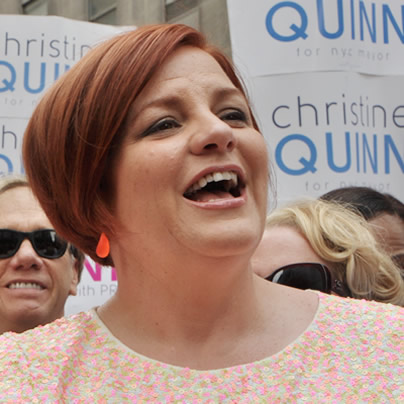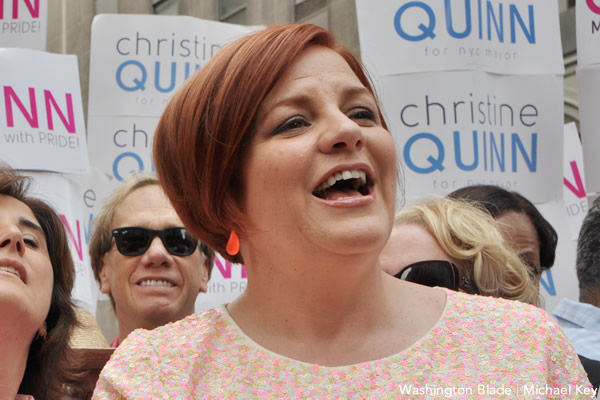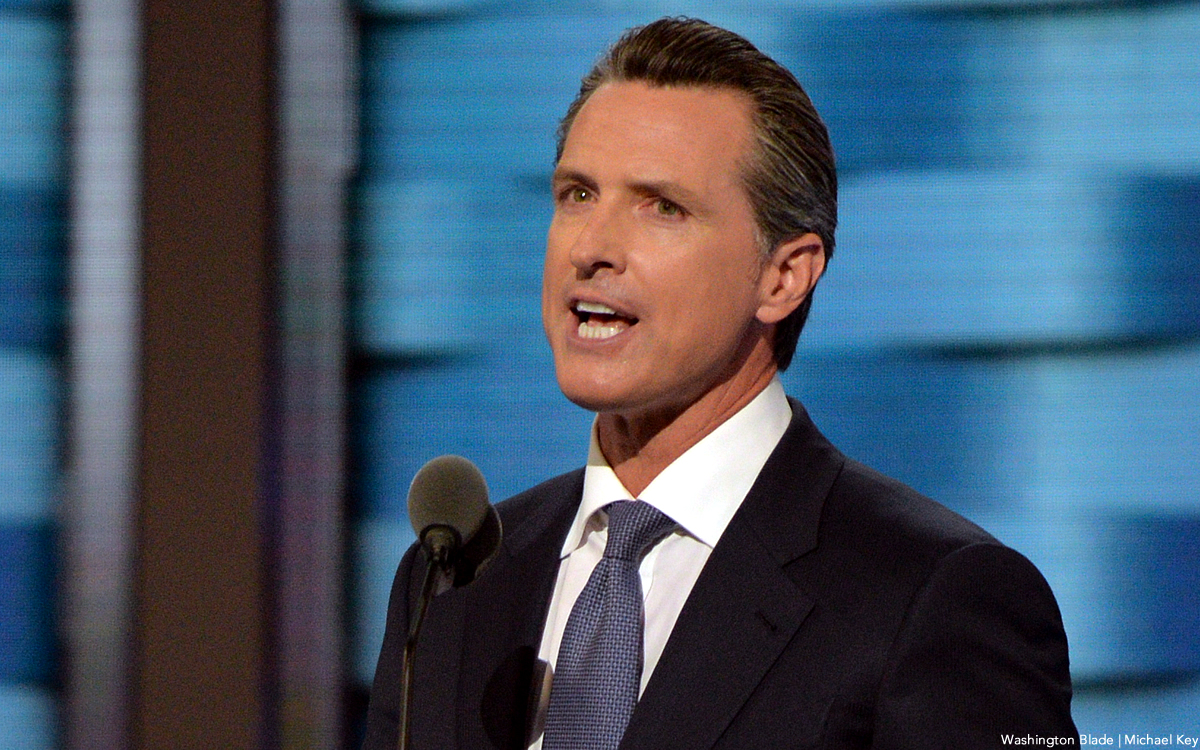National
Christine Quinn seeks to be mayor of ‘all 8.4 million’ New Yorkers
Democrat criticizes Anthony Weiner for “grandpa” comment at AARP forum


Openly gay New York City Council Speaker Christine Quinn is leading the Democratic Primary for mayor of America’s largest city. (Washington Blade photo by Michael Key)
New York City Council Speaker Christine Quinn on Wednesday said she is running for mayor because she wants to ensure New Yorkers have the same opportunities her grandparents had when they immigrated from Ireland a century ago.
“This is the greatest city in the world,” she told the Washington Blade. “I want to be mayor because I want to make sure the power and the possibility that existed for them exists in greater amounts for New Yorkers in our city and all the immigrants who are coming here every day.”
Quinn, 47, remains the frontrunner among her Democratic challengers going into the September 10 primary.
A Quinnipiac University poll released on July 29 shows Quinn leading New York City Public Advocate Bill de Blasio by a 27-21 percent margin among likely Democratic primary voters. Former New York City Comptroller William Thompson, Jr., came in third with 20 percent, while former Congressman Anthony Weiner garnered 16 percent.
Quinn would become the city’s first female and first openly LGBT mayor if voters elect her to succeed Mayor Michael Bloomberg in Gracie Mansion in November.
“We’re running to be the mayor of all 8.4 million people of all genders and all sexual orientations,” Quinn told the Blade, referring to a person whom she said whispered in her ear while on the campaign trail that her decision to run for mayor helped them come out. She said a man whom she hugged during June’s Brooklyn Pride had tears in his eyes. “It isn’t lost on me, the historic nature of this.”
Quinn also referenced her wife, Kim Catullo, whom she married in May 2012, as she discussed her campaign and the fact New York is a global financial capital.
“The top CEOs from all across the world, the leading international figures meet with the mayor of the city of New York,” Quinn said. “Their briefing will always talk about Christine Quinn and the wife.”
Quinn receives gay backing, criticism
The Gay and Lesbian Victory Fund; the Stonewall Democratic Club of New York City; Empire State Pride Agenda and Edith Windsor, the Manhattan widow who successfully challenged the Defense of Marriage Act before the U.S. Supreme Court, are among those who have endorsed Quinn. She is also scheduled to attend two campaign fundraisers on Fire Island later this month.
In spite of this support, Quinn continues to face criticism from some LGBT New Yorkers.
She faced widespread criticism from LGBT Democrats and others in 2008 when she supported the extension of term-limits that allowed Bloomberg and other city officials, including herself, to run for a third-term. Quinn earlier in the same year also acknowledged a City Council slush fund appropriated more than $17 million to community organizations that did not exist since 2001.
Brooklyn attorney Garfield Heslop in June filed a complaint with the New York City Campaign Finance Board that asked it to investigate Quinn over more than $20,000 in contributions her campaign received from donors in Houston, San Diego and Chicago after she attended Victory Fund events in the three cities in 2011 and 2012.
Quinn’s spokesperson Mike Morey defended the campaign’s actions in a statement he sent to the Blade after news of Heslop’s complaint broke.
“The question I think really is about what I have done with my time in office,” Quinn said in response to the Blade’s request for comment on criticisms she continues to receive from Allen Roskoff, co-founder of the Jim Owles Liberal Democratic Club and others. She pointed out she has balanced eight budgets on time as speaker of the City Council and stopped Bloomberg from laying off 4,100 teachers. “Everyone who is running for mayor was opposed to it. They may have even gone to press conferences. They may have attended a rally. I’m the one who stopped those layoffs. I’m the one who kept every firehouse and every library open during the recession. That’s a record of results during my time as speaker.”
Quinn also criticized Weiner for referring to Republican mayoral candidate George McDonald as “grandpa” during an American Association of Retired Persons (AARP) forum in Manhattan on Tuesday.
“There’s no reason for name calling, ever,” she said. “When people in public life are speaking of senior citizens, they should do it with respect and gratitude and not in a derogatory way.”
Quinn categorized the former congressman’s campaign as a “circus” in a statement she released last month after revelations that Weiner had sent lewd text messages to women after he resigned from Congress in 2011. She stopped short of saying he should drop out of the race.
“Anthony Weiner has clearly decided to run,” Quinn told the Blade. “Now it’s a question for the voters.”
Quinn weighs in on hate crimes, Russia
Quinn, who was executive director of the New York City Anti-Violence Project from 1996 to 1999, told the Blade that as mayor she would set a goal of the five boroughs “becoming a hate crime-free city” through working with the New York Police Department’s Hate Crimes Task Force, expanding the city’s anti-bullying curriculum and partnering with faith-based organizations. Her comments come less than three months after Elliott Morales allegedly shot Mark Carson, a gay man from Brooklyn, to death in Greenwich Village during what the NYPD has classified as a hate crime.
“That’s the work we have to keep doing until we get to the place where we get to zero as the statistics of hate crimes against any community,” Quinn said, speaking to the Blade shortly after she and other officials expressed outrage over racist graffiti that defaced a statue of Jackie Robinson in Brooklyn.
Quinn stopped short of calling for a boycott of the 2014 Winter Olympics in Sochi, Russia, over the country’s LGBT rights record. She praised President Obama’s decision to cancel a meeting with Russian President Vladimir Putin that had been scheduled to take place in Moscow ahead of next month’s G-20 summit in St. Petersburg.
“We all need to focus immediately on doing everything we can as Americans and as part of a larger international community to change what is going on in Russia,” Quinn told the Blade. “We’ve all got to keep pushing to make change. It’s really a life and death issue.”
U.S. Supreme Court
Supreme Court upholds ACA rule that makes PrEP, other preventative care free
Liberal justices joined three conservatives in majority opinion

The U.S. Supreme Court on Friday upheld a portion of the Affordable Care Act requiring private health insurers to cover the cost of preventative care including PrEP, which significantly reduces the risk of transmitting HIV.
Conservative Justice Brett Kavanaugh authored the majority opinion in the case, Kennedy v. Braidwood Management. He was joined by two conservatives, Chief Justice John Roberts and Justice Amy Coney Barrett, along with the three liberal justices, Sonia Sotomayor, Elena Kagan, and Ketanji Brown-Jackson.
The court’s decision rejected the plaintiffs’ challenge to the Affordable Care Act’s reliance on the U.S. Preventative Services Task Force to “unilaterally” determine which types of care and services must be covered by payors without cost-sharing.
An independent all-volunteer panel of nationally recognized experts in prevention and primary care, the 16 task force members are selected by the secretary of the U.S. Department of Health and Human Services to serve four-year terms.
They are responsible for evaluating the efficacy of counseling, screenings for diseases like cancer and diabetes, and preventative medicines — like Truvada for PrEP, drugs to reduce heart disease and strokes, and eye ointment for newborns to prevent infections.
Parties bringing the challenge objected especially to the mandatory coverage of PrEP, with some arguing the drugs would “encourage and facilitate homosexual behavior” against their religious beliefs.
U.S. Supreme Court
Supreme Court rules parents must have option to opt children out of LGBTQ-specific lessons
Mahmoud v. Taylor case comes from Montgomery County, Md.

The U.S. Supreme Court on Friday ruled that public schools must give advance notice to parents and allow them the opportunity to opt their children out of lessons or classroom instruction on matters of gender and sexuality that conflict with their religious beliefs.
Mahmoud v. Taylor was decided 6-3 along party lines, with conservative Justice Samuel Alito authoring the majority opinion and liberal Justices Sonia Sotomayor, Elena Kagan, and Ketanji Brown-Jackson in dissent.
Parents from diverse religious backgrounds sued to challenge the policy in Maryland’s Montgomery County Public Schools when storybooks featuring LGBTQ characters were added to the elementary school English curriculum in 2022.
The school board argued in the brief submitted to the Supreme Court that “the storybooks themselves do not instruct about gender or sexuality. They are not textbooks. They merely introduce students to characters who are LGBTQ or have LGBTQfamily members, and those characters’ experiences and points of view.”
Advocacy groups dedicated to advancing free speech and expression filed amicus briefs in support of the district.
PEN America argued the case should be viewed in the context of broader efforts to censor and restrict what is available and allowable in public schools, for instance by passing book bans and “Don’t Say Gay” laws.
The ACLU said the policy of not allowing opt-outs is religion-neutral, writing that the Supreme Court should apply rational basis review, which requires only that the school district show that its conduct was “rationally related” to a “legitimate” government interest.
LGBTQ groups also objected to the challenge against the district’s policy, with many submitting amici briefs including: the National Center for Lesbian Rights, GLAD Law, Family Equality, COLAGE, Lambda Legal, the Leadership Conference on Civil and Human Rights, PFLAG., and the National Women’s Law Center.
The Human Rights Campaign did not submit a brief but did issue a statement by the group’s President Kelley Robinson: “LGBTQ+ stories matter. They matter so students can see themselves and their families in the books they read–so they can know they’re not alone.”
“And they matter for all students who need to learn about the world around them and understand that while we may all be different, we all deserve to be valued and loved,” she said. “All students lose when we limit what they can learn, what they can read, and what their teachers can say. The Supreme Court should reject this attempt to silence our educators and ban our stories.”
Federal Government
White House finds Calif. violated Title IX by allowing trans athletes in school sports
Education Department threatens ‘imminent enforcement action’

The Trump-Vance administration announced on Wednesday that California’s Interscholastic Federation and Department of Education violated federal Title IX rules for allowing transgender girls to compete in school sports.
In a press release, the U.S. Department of Education’s Office of Civil Rights threatened “imminent enforcement action” including “referral to the U.S. Department of Justice” and the withholding of federal education funding for the state if the parties do not “agree to change these unlawful practices within 10 days.”
The agency specified that to come into compliance; California must enforce a ban excluding transgender student athletes and reclaim any titles, records, and awards they had won.
Federal investigations of the California Interscholastic Federation and the state’s Department of Education were begun in February and April, respectively. The Justice Department sued Maine in April for allowing trans athletes to compete and refusing a similar proposal to certify compliance within 10 days.
Broadly, the Trump-Vance administration’s position is that girls who are made to compete against trans opponents or alongside trans teammates are unfairly disadvantaged, robbed of opportunities like athletics scholarships, and faced with increased risk of injury — constituting actionable claims of unlawful sex discrimination under Title IX.
This marks a major departure from how the previous administration enforced the law. For example, the Department of Education issued new Title IX guidelines in April 2024 that instructed schools and educational institutions covered by the statute to not enforce categorical bans against trans athletes, instead allowing for limited restrictions on eligibility if necessary to ensure fairness or safety at the high school or college level.
Sports aside, under former President Joe Biden the department’s Office of Civil Rights sought to protect against anti-LGBTQ discrimination in education, bringing investigations and enforcement actions in cases where school officials might, for example, require trans students to use restrooms and facilities consistent with their birth sex or fail to respond to peer harassment over their gender identity.
Much of the legal reasoning behind the Biden-Harris administration’s positions extended from the 2020 U.S. Supreme Court case Bostock v. Clayton County, which found that sex-based discrimination includes that which is based on sexual orientation or gender identity under Title VII rules covering employment practices.
A number of high profile Democrats, including California Gov. Gavin Newsom, have recently questioned or challenged the party’s position on transgender athletes, as noted in a statement by Education Secretary Linda McMahon included in Wednesday’s announcement.
“Although Gov. Gavin Newsom admitted months ago it was ‘deeply unfair’ to allow men to compete in women’s sports, both the California Department of Education and the California Interscholastic Federation continued as recently as a few weeks ago to allow men to steal female athletes’ well-deserved accolades and to subject them to the indignity of unfair and unsafe competitions.”
-

 U.S. Supreme Court2 days ago
U.S. Supreme Court2 days agoSupreme Court upholds ACA rule that makes PrEP, other preventative care free
-

 U.S. Supreme Court2 days ago
U.S. Supreme Court2 days agoSupreme Court rules parents must have option to opt children out of LGBTQ-specific lessons
-

 National3 days ago
National3 days agoEvan Wolfson on the 10-year legacy of marriage equality
-

 India3 days ago
India3 days agoIndian court rules a transgender woman is a woman











